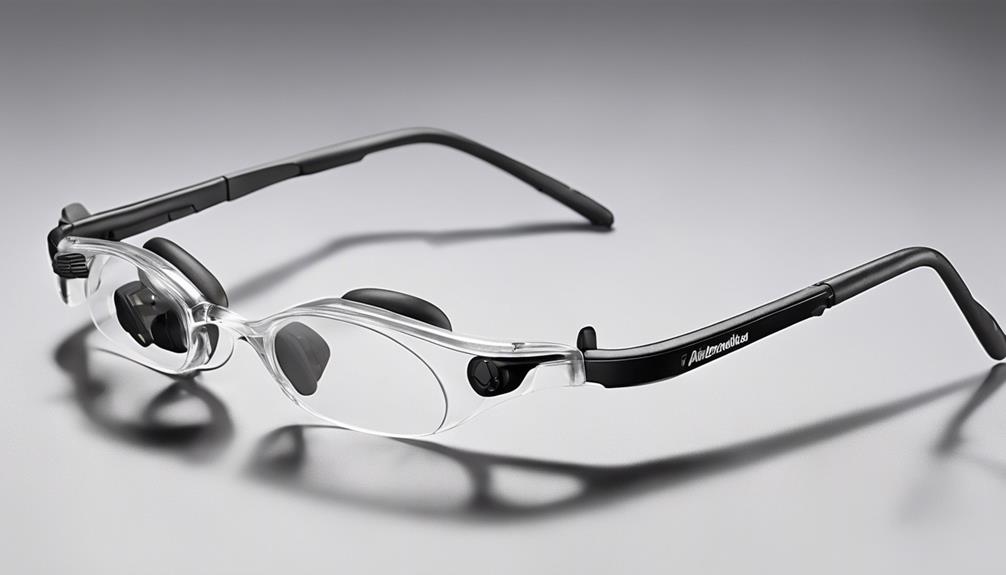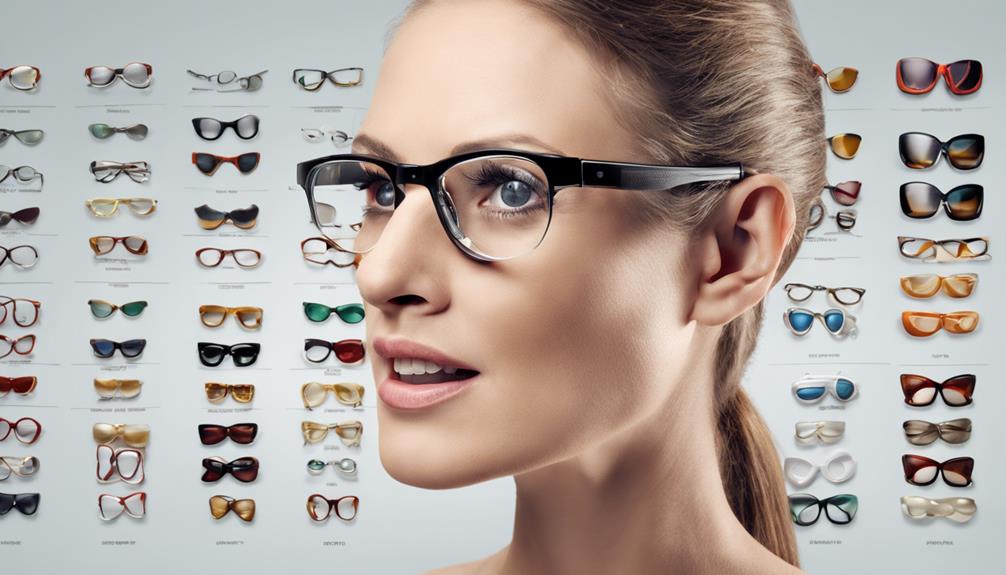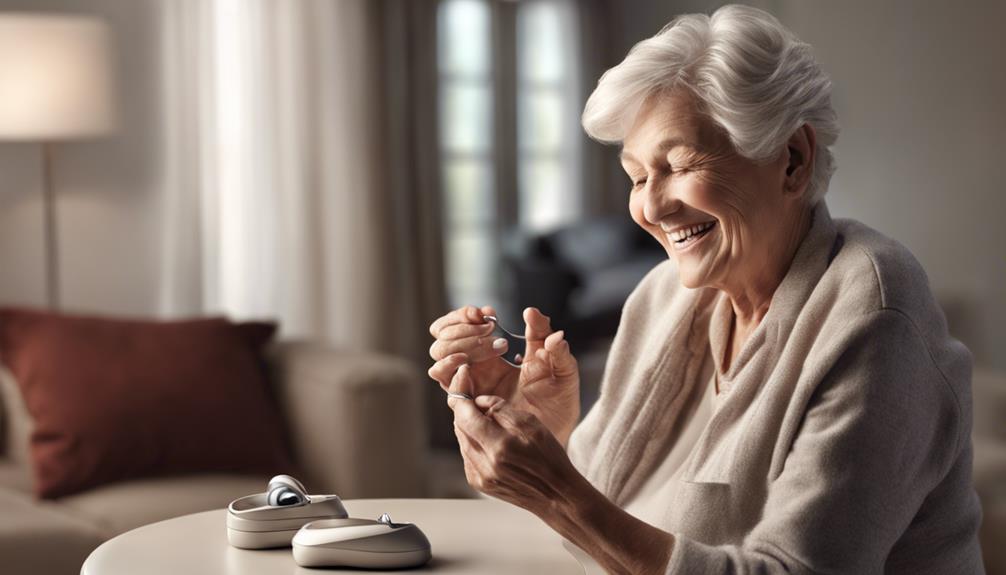It can be easy to overlook the fact that glasses equipped with hearing aids can provide a subtle and beneficial option for those experiencing hearing impairment.
The integration of advanced technology in these devices allows for a seamless blend of hearing assistance and vision correction.
As we explore the benefits and features of hearing aid glasses, we uncover a fascinating intersection of innovation and practicality that could revolutionize the way we perceive assistive devices.
Let's delve into the world of hearing aid glasses and discover how they are reshaping the landscape of hearing assistance.
Key Takeaways
- Enhances hearing in challenging environments
- Promotes inclusivity and understanding
- Empowers individuals in social interactions
- Integrates advanced technology in discreet design
Benefits of Hearing Aid Glasses
Hearing aid glasses provide an innovative solution for individuals with mild to moderate hearing loss, offering enhanced hearing capabilities in challenging environments. These glasses not only improve focus but also enhance capabilities by providing clearer sound, especially in noisy settings. The social interactions of individuals wearing these glasses are positively impacted as they can now engage more effectively in conversations even in challenging environments. This improved hearing experience allows wearers to break stereotypes associated with traditional hearing aids, promoting inclusivity and understanding.
Designed for individuals with mild to moderate hearing loss, the open-ear design of hearing aid glasses plays a crucial role in delivering a more natural sound experience. Unlike traditional hearing aids, these glasses require minimal adjustment, making them user-friendly and convenient for daily use. By enhancing sound clarity in noisy situations, hearing aid glasses empower individuals to navigate social interactions with confidence and ease, ultimately improving their quality of life.
Features to Consider

When considering features for optimal performance, it is essential to evaluate the technology integrated into hearing aid glasses. New Hearing Aid Glasses come with various innovative features that enhance the hearing experience. The table below outlines key features to consider when selecting hearing aid glasses:
| Feature | Description | Benefit |
|---|---|---|
| Front-facing microphone array | Captures sound from the environment for processing | Improved sound quality and clarity |
| Open-ear design | Directs audio towards the ear canal, providing natural sound and reducing adjustments | Comfort and natural listening experience |
| Real-time audio processing | Enhances speech understanding in noisy environments | Improved communication in challenging settings |
| Voice isolation | Filters out background noise and focuses on the speaker's voice | Clearer conversations with reduced distractions |
These features, such as the front-facing microphone array and real-time audio processing, along with technologies like beamforming and voice isolation, work together to provide a seamless and effective hearing aid glasses experience. By considering these aspects, users can choose hearing aid glasses that best suit their needs and lifestyle.
How Hearing Aid Glasses Work
Integrated into the frames of eyeglasses, hearing aid glasses combine advanced hearing aid technology with discreet and convenient design for individuals with mild to moderate hearing loss. These innovative glasses work by utilizing built-in microphones to pick up sounds, which are then processed and enhanced by the device. One key feature is the presence of directional microphones that help focus on specific sounds while reducing background noise, improving the wearer's ability to hear conversations or important sounds in noisy environments.
Hearing aid glasses can deliver sound to the wearer's ear using either bone conduction or air conduction technology. Bone conduction sends sound vibrations through the bones of the skull directly to the inner ear, bypassing the outer and middle ear, while air conduction delivers sound through the ear canal in a more traditional manner. This discreet and convenient solution enhances hearing by providing a seamless integration of hearing aid technology into everyday eyewear, offering a practical and effective way to address hearing loss.
Choosing the Right Pair

After understanding how hearing aid glasses work, the next crucial step is selecting the right pair that best suits your specific hearing needs and comfort preferences. When choosing the perfect hearing aid glasses, consider the following:
- Compatibility: Ensure the glasses are compatible with your specific hearing aid to guarantee optimal functionality.
- Design: Look for a design that accommodates the hearing aid without causing discomfort, ensuring a seamless experience.
- Adjustable Features: Opt for glasses with adjustable features to customize the fit and ensure maximum comfort.
- Thin Temples: Choose glasses with thin temples to provide ample space behind the ears for the hearing aid.
Consulting with an audiologist or optician can also be beneficial in selecting the most suitable pair of hearing aid glasses for your individual needs. By considering these factors, you can customize the fit, enhance comfort, and improve your overall hearing aid experience.
Real User Experiences
Through real user experiences, insights into the effectiveness and benefits of hearing aid glasses have been garnered, shedding light on their impact in various scenarios. Users reported enhanced hearing capabilities in noisy environments with the Nuance Hearing glasses, showcasing the advanced hearing technology integrated into the Israeli startup's innovative product. Positive feedback highlighted the glasses' ability to isolate voices and improve focus during conversations, a significant advantage in social settings. Some individuals noted a reduction in issues like hearing their own voice louder and feedback, enhancing the overall user experience. Moreover, the potential benefits observed for individuals with normal hearing suggest a broader usability of these BTE devices. Confidence in the glasses' quality hearing and future enhancements was expressed by users who tried glasses for the first time, indicating a promising future for this new entrant in the hearing aid market.
| User Experiences | Benefits |
|---|---|
| Enhanced hearing in noisy environments | Improved focus during conversations |
| Reduction in issues like loud own voice and feedback | Potential benefits for individuals with normal hearing |
Frequently Asked Questions
Can You Get Hearing Aid Glasses?
Yes, you can get hearing aid glasses that combine the benefits of hearing aids and eyeglasses. These innovative products are designed to enhance hearing capabilities, particularly in noisy environments.
They're suitable for individuals with mild to moderate hearing loss, aiming to improve sound clarity and conversation focus. EssilorLuxottica is actively developing hearing aid glasses with open-ear designs to ensure optimal comfort and functionality for users.
What Are the Glasses for Missing Ears?
We found that glasses for missing ears, also known as hearing aid glasses, are designed to offer both vision correction and hearing assistance in one integrated product.
These glasses feature built-in hearing aids to help individuals with hearing loss hear clearly while wearing them.
The design aims to discreetly incorporate hearing aid technology into stylish eyewear frames for a seamless and functional experience.
Users can enjoy improved hearing capabilities without the need for separate devices, enhancing convenience and comfort.
What Are the Ear Holders on Glasses Called?
They're commonly called temple tips or temple arms. These essential components provide comfort and stability by securing glasses behind the ears.
Temple tips are available in various materials like plastic, silicone, or metal to cater to different preferences. Their primary function is to ensure that glasses stay in place during daily activities.
Properly fitted temple tips can prevent discomfort and ensure a secure fit, enhancing the overall glasses-wearing experience.
What Is Hearing Aid Prescription?
We determine a hearing aid prescription by assessing individual hearing needs, considering factors like type and severity of hearing loss, lifestyle, and listening environments.
A hearing healthcare professional, such as an audiologist, conducts a thorough evaluation to recommend personalized settings. The prescription includes amplification levels, frequency adjustments, and special features tailored to the user's profile.
Regular follow-up appointments are crucial to maintaining the prescription's effectiveness for optimal hearing support.
Conclusion
Just as a symphony conductor skillfully orchestrates a harmonious blend of instruments, hearing aid glasses conduct a seamless fusion of hearing assistance and eyewear. These innovative devices compose a perfect melody of enhanced hearing capabilities and visual clarity, transforming the way individuals with mild to moderate hearing loss experience the world around them.
Like a well-tuned instrument, hearing aid glasses harmonize functionality and fashion, offering a symphony of benefits to those who wear them.









